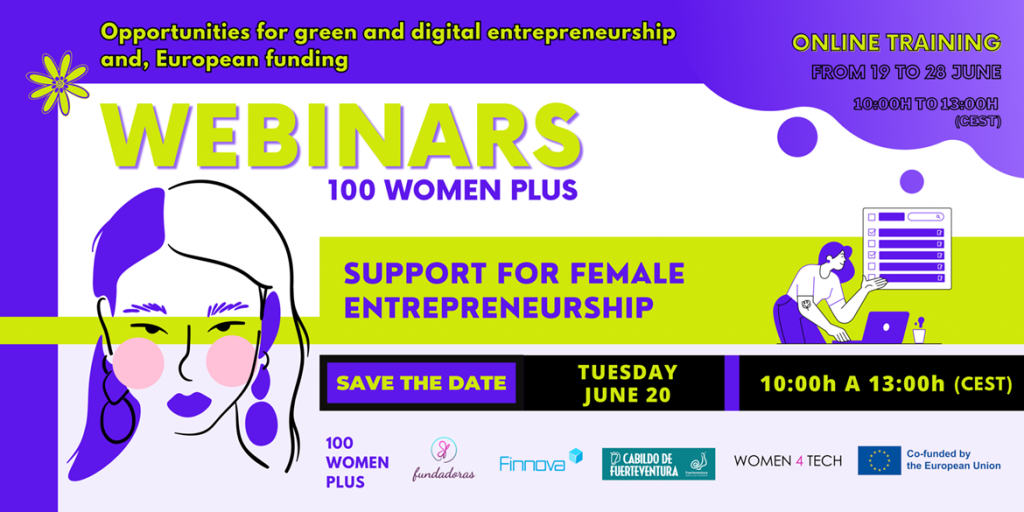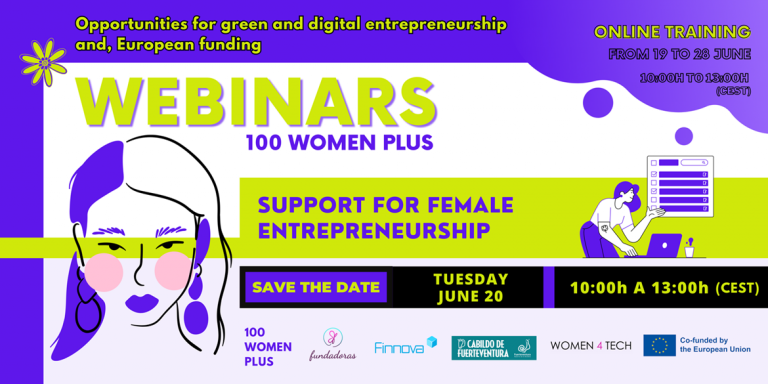
- The second day of the series of online seminars has focused on the gender gap, the factors that cause this phenomenon and different initiatives to reach equality
- A total of 6 speakers participated in this day’s lecture
20/06/2023, Brussels. Today, Tuesday 20th June from 10:00 to 13:00 (CEST), the second day of the online event “Opportunities for green and digital entrepreneurship and European funding” was held. Today’s session, entitled “Supporting women’s entrepreneurship”, was focused on the gender gap in the world of entrepreneurship, the reasons behind this phenomenon and the different ways to achieve greater equality. The session was attended by 6 speakers who presented various initiatives aimed at reducing this gap.
The session was opened by the economist and coordinator of the Innovatia 8.3 Program, Eva López, who highlighted the need to incorporate the gender perspective in the creation of companies. During her speech, Lopez explained the basis of the program she coordinates and underlined the main conclusions drawn by the program during its 12 years of existence: the lack of gender perspective in technology transfer, the importance of gender training and the glass ceiling in the world of entrepreneurship.
Lola Bordás, president of Asociación Fundadoras and marketing director of Finnova, took over the webinar. This presentation focused on the collaboration between the association and the 100 Women Plus project, since Asociación Fundadoras disseminates examples of different female entrepreneurship projects. Precisely, this dissemination is one of the pillars of the work of the association, in addition to cooperation, the search for recognition and positioning of women.
Manuela Granada, member of the communication and marketing department of Finnova, has been in charge of explaining the tools available for women entrepreneurs through European funds. As she explained in her speech, “in an eminently masculine world such as entrepreneurship, one of the challenges is to facilitate women’s access to these funds”. Granada emphasized the actions carried out by Finnova in this area, highlighting the Startup Europe Awards initiative, responsible for searching talent in different startups.

The next speaker was Ana Yael, SHE ambassador and founder of Rumbo Umbral and Serenity. Her intervention focused on synergetic leadership, a concept that, in Yael’s words, “is key to support women’s networks and their entrepreneurial initiatives”. At the same time, the concept of “facilitative leadership” has been put on the table, in which it is proposed to abandon autocratic leadership models, to bet on collaborative structures and to create diverse working groups, which allow to achieve a greater richness to the dynamics of the groups and a successful cooperation.
Carla García, European project manager at Finnova, presented information that demonstrates the lack of equality in the world of entrepreneurship. Among these data, several stand out as that of all researchers in the world, only 30% are women, the current digital divide (it is estimated that there are 150 million more men than women with access to digital tools) or the lower presence of women in studies related to science, technology, engineering and mathematics. In order to address this difficulty, García proposes to companies measures that allow a better work-life balance, such as increasing teleworking or the right to disconnect.
The second session was brought to an end by Alexia Regas, International Conference Manager of Ayoka Fellowship (La Puerta de África). The aim of this initiative is to transform Africa-Europe relations through youth, creating spaces for reflection and co-creation on common challenges and decolonialism. People belonging to this network often participate in events related to these areas, presentations that take the opportunity to place women who can be seen as references or role models.

Next Monday, June 26 at 10:00 (CEST), the third of five days of this webinar series, entitled “Opportunities in the Digital Economy,” will be held. The purpose of these webinars is the dissemination of opportunities linked to green and digital entrepreneurship, actions to support female entrepreneurship, as well as funding opportunities offered by the European funding framework. These conferences are organized, in addition to Finnova, by different partners such as the Cabildo de Fuerteventura, a body aligned with SDGs such as gender equality or decent work, Woman 4 Tech, an open innovation tool to identify disruptive start-ups and raise awareness of the importance of self-entrepreneurship as a driver of employment and by Asociación Fundadoras, an organisation that supports female entrepreneurship by creating a strong community to give visibility and reward women in the workplace and entrepreneurship.
About the 100 Women Plus project:
This project co-financed by the EU Erasmus plus Program and led by Finnova, in collaboration with the Cabildo of Fuerteventura and Asociación Fundadoras, was born in an attempt to address the need for greater equality and enhance international cooperation on women’s empowerment. 100 Women Plus that has been designed to improve the channels of collaboration and dialogue, propose a series of learning activities, exchange of experiences and transfer of results that contribute to establish new mechanisms for female participation, strengthen the ecosystem of women entrepreneurs in the participating countries and create networks and generate partnerships between institutions in Europe and Africa.
About the Finnova Foundation:
Finnova is the Spanish-Belgian non-profit foundation based in Brussels and Spain, working for the promotion and development of innovation and entrepreneurship in the EU. Finnova’s experience in leading communication and dissemination activities of European projects is combined with a solid proven track record in business creation and entrepreneurship support programs, such as accelerators, incubators and events, as well as its commitment to training and employability of young people.

